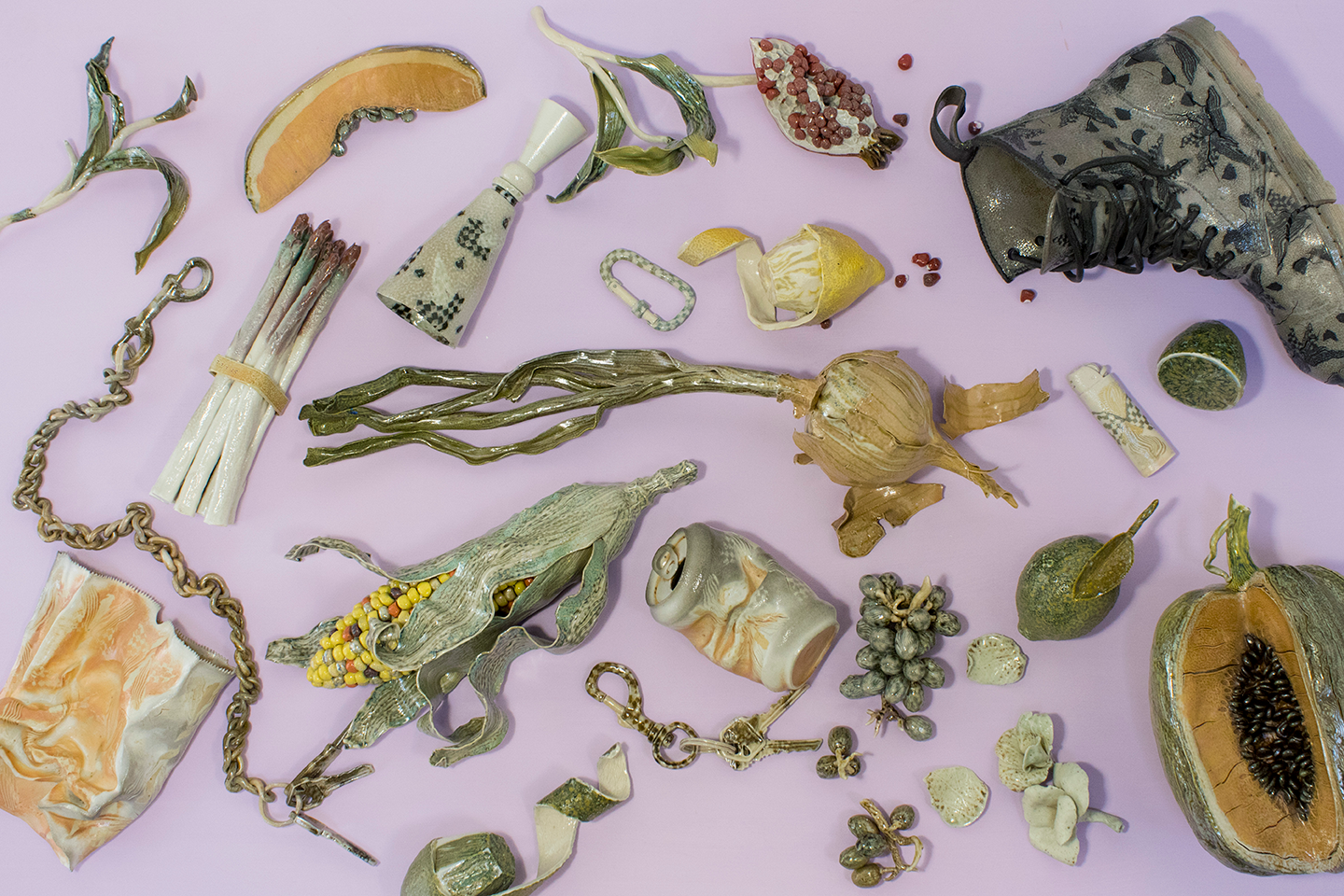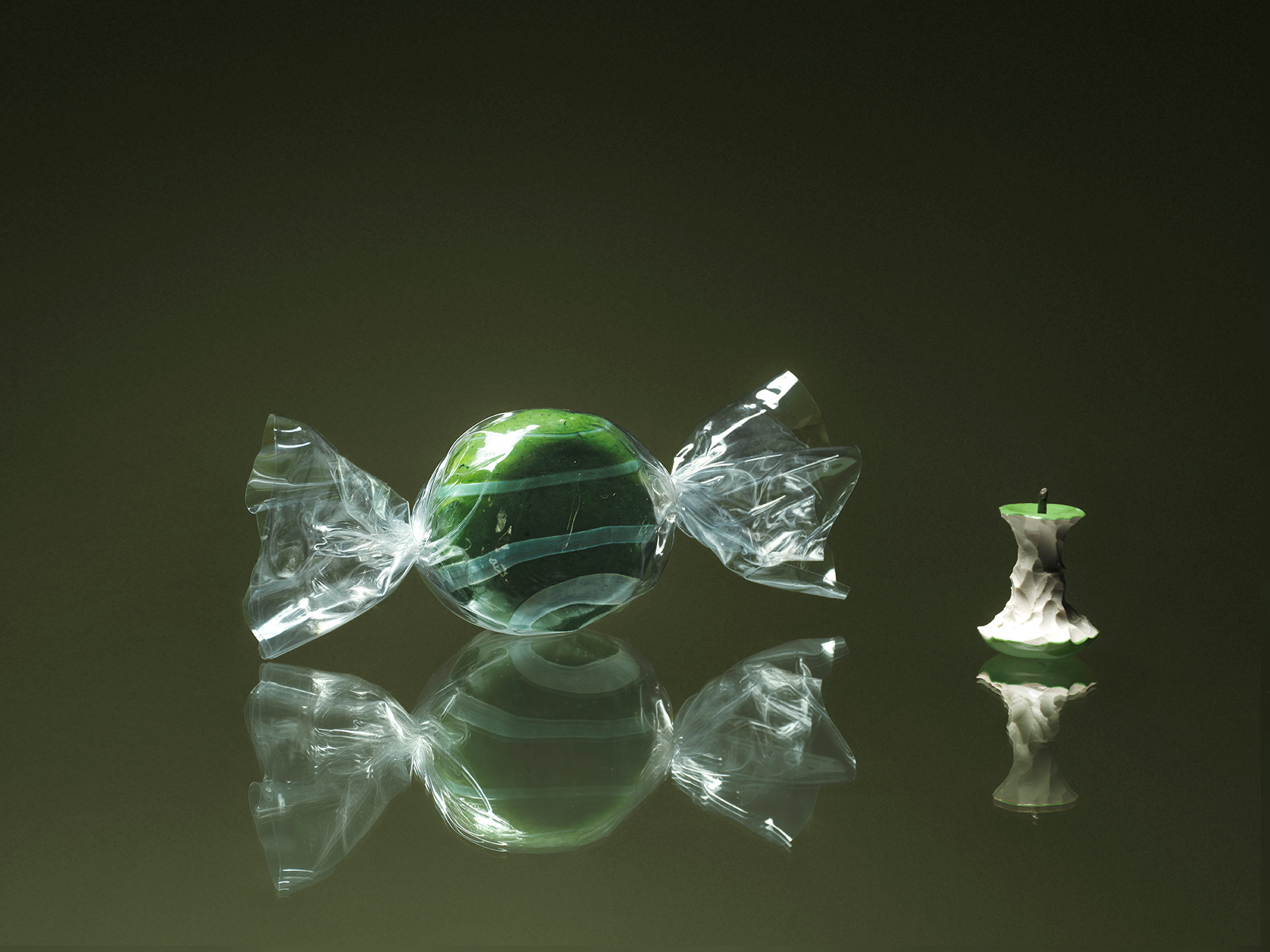
I’ve counted and recounted (and had the numbers confirmed by other parties because, let’s face it, I dabble in words not numbers) and this is Grain’s 199th issue. That means Grain will be celebrating its 200th issue soon! We have exciting celebration plans in the works, including an in-person and livestreamed launch on October 25, 2025, but I don’t want to give away too many spoilers right now. I just want to remind you to mark your calendars before I plunge into talking about this splendiferous Summer issue.
Objects. We throw away some, hoard some. Cherish, covet, and neglect others. Fill shoeboxes with random things, like cassette tapes and baby teeth, and we label them keepsakes or clutter. These objects, or things, are pretty powerful, too; transformative, even. A wedding ring, for example, can transport us to the past, a millipede to the future. A hair clip can make us feel like dancing, while an oversized testicle can send us shame-spiralling down an internet rabbit hole.
Inspired by the title of this issue, which is drawn from Lindsay Wilson’s poem, I’m going to do something a bit different in this editor’s note. I’m going to give you a homework assignment. (Do editors ever give readers homework? Surely, I can’t be the only one.) I invite you, as you make your way through the issue, to seek and find the objects (hint: each story, poem, and essay has at least one). Then, considering topics like value, objectification, purpose, and intent, I wonder, can you follow “the lines between things”? What makes something valuable (to the writer, to the character, to you)? Why do we attach meaning to objects that could otherwise be considered nothing more than products of our industrialized consumer culture? From where does an object get its power?
As you’re reading, go ahead and circle the objects. Highlight things. Dog-ear pages. Mark up the margins with notes. I encourage you to literally draw lines between things. I won’t ask you to hand anything in, or tag us with #grainseekandfind on social media. It’s not for grades. It’s just for you. To deepen your connection to the writing. To form lines between you, as the reader, and the incredible writers. A way to make meaning of your own in this issue, which is, of course, a literary object. Where will the lines take you?
- Elena Bentley, Editor
KATAMARI | Jonathan Moskaluk
When my doctor tells me, casually,
to drop my pants, I regret
wearing taco-themed underwear.
When he asks—ball in hand—
for a growth timeline,
I feel like a bad steward of my body.
Either it grew like a goldfish—
in accordance with tank size—
or it’s halfway through eating the other one.
When the ultrasound tech has
me lay my penis across my stomach
and cover it with a thin sheet,
I realize that sometimes,
shape is more revealing than colour.
I wait for results,
our plum tree droops
under the weight of its fruit,
I research objects of similar size:
large duck egg, Cresthaven peach, cricket ball.
In a dream it rolls away,
gains mass like a snowball—
picks up gravel and speed,
the neighbour’s polydactyl cat,
the row of new saplings at the park,
the old-growth forests and the water bombers.
It’s not until the urologist says
everything looks good, just a big nut,
that I remember I have a pair of them.
My right (your left) has been fondled,
jellied and photographed.
It has a poem written about it.
But there, right there, is another:
pigeon egg, small apricot, ping pong ball.
BARRELS | Morgan Christie

Devine’s sister was the usual recipient of these shipments back in Montego Bay. She’d sort the contents and split them up amongst family, so that everyone would get their fair share. Barrels often arrived and would be cleaned out in minutes, people knuckling and grabbing as much as they could in an elbowed free-for-all. That’s not the way Devine wanted it. Whoever wasin the most need would get what they required. She’d load the barrel up with as many cans of whatever fish or vegetable she could find on sale, maybe some peanut butter and jam if she was lucky. Thrift store radios, the battery-powered kind, were a hit, and mismatched pieces of clothing in any size; her sister would always find someone to fit them. Little fixtures and figurines would decorate the barrel’s edges, small utensils wrapped and stacked in the middle, and she’d load up on extra diapers when she could, their scent soft and powdered, stuffing them down the sides like usable packing peanuts to cushion the trip.
It was almost like a dance, this barrel preparation. A uniform and strategic medley of all of the things she could and couldn’t afford being closed then opened in celebratory repetition, for decades. All beautifully buffed, it would take her hours of meticulous cleaning and spot checking to get the items just right before sending them off; the sparkling secondhand treasures that occupied the homes of family and strangers, on display like the souvenirs they were, small pieces of Devine’s shining and elegant life, worlds away.
Devine heard Grace jiggle the knob before shouldering the door open and letting herself and Rion in. It’d stick sometimes, but at least it could close. Her daughter glanced around the cluttered apartment and sighed a little when she took note of the rich blue centrepiece of the living room.
“You got the barrel today?” Grace asked.
Devine nodded.
Grace leaned against the door frame. “How’s Mr. Fahad?”
“Good, still chattin’.”
“Any good stories?”
Devine shook her head. “Sometin’ about letters from the moon, in Arabic. Mi can’t rememba.”
“I love the moon,” Rion said as he placed his shoes on the mat. “It can be big sometimes and skinny sometimes. What kind of letter did he say it sent, Grandma?”
Devine didn’t hear him. She was trying to decide what to put on top of the sardine cans and soup. Rion glanced at his mother and then Grace glanced at hers.
“Mom,” Grace said. “He asked you a question.”
“Hmm,” Devine replied. “Yes, come hand me those shirts there.” He joined his grandmother on the floor and began helping her organize the contents. Grace dug into her purse and took out four dollars in coins and some change before heading to work.
GHAZAL II | Milan Parab
for Mark Callanan
I eat the sun and turn to leave. The wind is sharp,
from the Northeast. The evening’s sky a palette of magenta,
indigo hues. Is there any colour more suited for our journey? Earlier,
we neared a church, the smell of thunder, electric.
Walk the pond once round and talk out history
along the shoreline, the echoed sounds of chatter,
remnants of memory and the suffering thereafter. What is direction
anyways? Arriving before the boat, we enter its hull as two
tall shadows, drift quiet, the drip and carve of pond,
sink deep tonight and fish out life before it rains.
Do you hear it now? Somewhere across this reflection
the bullfrog’s baritone bellow
reverberates along the surface,
snags a misguided mosquito with its lure. Its song
catches us in connection with these waters.
Cattails rattle as prayer beads in a breeze.
Where does your thumb lead you tomorrow? Point it East, the desert heat
carries like a minaret calling you to pray. Rain begins its own poem.
We leave silently, washed of a pilgrimage promised
between us. The sky lets go. The car drives down the highway
empty of conversation. Do you hear that? Tom. He’s been here from the start,
singing. How many windows can be opened at once?
MERP | Peter Luo

“Wait ... did you just say ‘nibble’?”
Having been gaming and working so long, Pang wondered if he could just be hearing things. Perhaps a stray sound from the outside world. In the spirit of cohabitation, he had been able to slowly decipher Dango’s language. Reeorrr meant “follow me to the snack cabinet.” Meoo meant “pets please.” And Dango certainly was not a quiet eater, sometimes nyeom nyeom, other times nyum nyum nyum, but never “nibble.”
Dango looked up from his food bowl and into Pang’s eyes. An unwavering attention only a cat could muster. Eyes like supernovas. Pang stared back, skeptical. He felt sillier by the second while waiting for a verbal response from his cat. Until finally, he was vindicated and awed.
“Your neural enhancers must have kicked in,” Dango mewed.
Pang’s eyes widened to match Dango’s: bewildered. Dango continued, unphased.
“My name is Daŋɡó, and I am here on behalf of the Earth Species Federation to perform our annual tests as part of the Mammalian Evolution Readiness Program.”
“You ... you mean Dango, your name is Dango ... .” Pang stuttered, noticing an intonation difference in the pronunciation. A brief silence.
“My birth name is Daŋɡó.”
Their first night together, Pang had named Dango after the Cantonese word for cake (蛋糕, daan6 gou1), an homage to his fluffy exterior. He found it fitting for his pet to have a food name rather than a human name, like Frank. Trendy, even. Petting Dango sounded cute, petting Frank sounded kinky.
“I see. So it sounds more like the Japanese dessert then?” Pang questioned, feeling a tinge of anxious embarrassment. He had never been good with names.
Daŋɡó blinked twice with the same unwavering eyes.
“Phonetically correct, though in my language it means: to scratch philanthropically with fervour and poise for just cause.”
His response did not leave room for further tangents.
Pang only nodded. The type of nod he would give at a university lecture series where his only incentive was to eat the free pizza.
This was a first. Certainly, he had talked at Dango before, but he never expected a response. Like talking to a baby. He pinched himself in the arm, something he’d seen before in the movies. The nerves responded as expected, but he still couldn’t be sure. His dreams would usually feel just as realistic.




